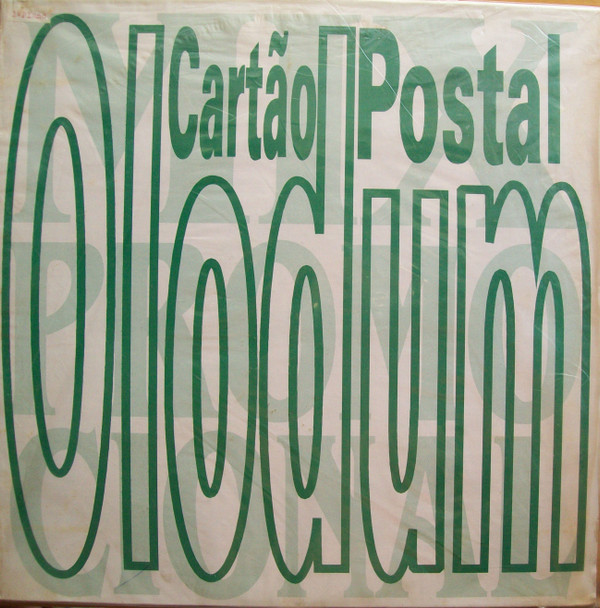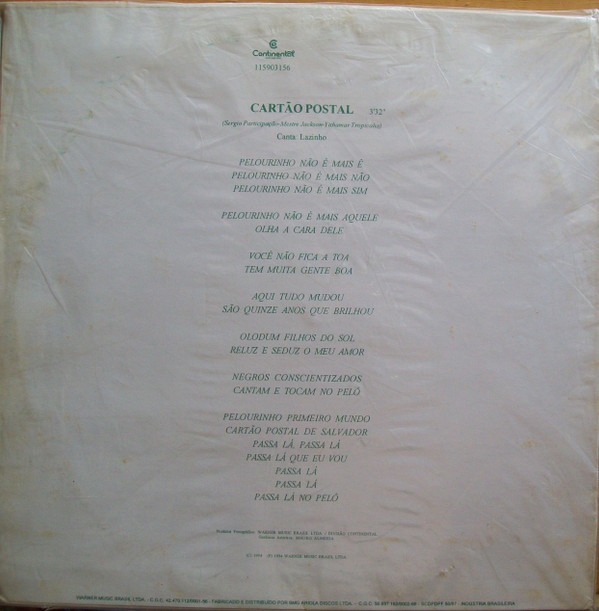Olodum - Cartão Postal
Download
Filename: olodum-carto-postal.zip- MP3 size: 4.2 mb
- FLAC size: 50.5 mb
Table of Contents
Tracks
| Track | Duration | Preview |
|---|---|---|
| Cartão Postal | 3:32 |
Images


Catalog Numbers
115903156Labels
ContinentalListen online
- lytte på nettet
- écouter en ligne
- lyssna på nätet
- ouvir online
- online luisteren
- online anhören
- escuchar en línea
- kuunnella verkossa
- ascolta in linea
Formats
- Vinyl
- 12"
- Promo
Companies
| Role | Company |
|---|---|
| Manufactured By | BMG Ariola Discos Ltda. |
| Licensed From | Warner Music Brasil Ltda. |
About Olodum
Olodum is a cultural group based in the Afro Brazilian community of Salvador, the capital city of the state of Bahia, Brazil. It was founded by percussionist, Neguinho do Samba.
One of many similar groups in the city (and elsewhere in Brazil), it offers cultural activities to young people, largely centered around music; it also offers theatrical productions and other activities. Founded in 1979, its stated aims are to combat racism, to encourage self-esteem and pride among Afro Brazilians, and to fight for civil rights for all marginalized groups.
Olodum is widely credited with developing the music style known as samba reggae and for its active participation in carnaval each year. Neguinho do Samba, the lead percussionist, created a mix of the traditional Brazilian samba beat with merengue, salsa, and reggae rhythms for the Carnaval of 1986. This became known as samba reggae. This "bloco afro" music is closely tied to its African roots, as seen through its percussion instruments, participatory dancing and unique rhythm. It also directly draws from many Caribbean cultures, like Cuba and Puerto Rico. Olodum's performing band (or Banda) has released records in its own right and has been featured on recordings by Brazilian stars such as Simone and Daniela Mercury.
Olodum performed on Paul Simon's 1990 album The Rhythm of the Saints and at the subsequent concert in Central Park, New York City on August 15, 1991.
In 1995, Olodum appeared in the second music video for Michael Jackson's single, "They Don't Care About Us" (the original "Prison version" was banned on most music stations due to its violent scenes). The music was changed slightly to fit Olodum's style of drumming. The "Olodum version" (unofficial title) of the song has since become more popular than the original album version.
Name Vars
- Banda Olodum
- Banda Reggae Olodum
- Groupo Cultural Olodum
- Grupo Cultural OLODUM
- Grupo Cultural Olodum
- Grupo Olodum
- Olodum Banda Reggae
- Olodum Mirim
- Olodun
Members
- Neguinho Do Samba
- Lázaro Silva
- Ito Bispo
- Lucas di Fiori
Related albums
Top Albums
Various - Anacreonticks The Golden Age Of Song Authentic English Music And Drinking Songs For Clubs Societies Wine Cellars Licensed Taverns Music Halls And Pleasure Gardens
Various - The Best Of X Tra Records
Various - Gods And Generals Original Motion Picture Soundtrack
Klaus Badelt And Ramin Djawadi - Beat The Drum Original Motion Picture Soundtrack
Enesco Vienna State Opera Orchestra Conductor Vladimir Golschmann, Lizst Conductor Anatole Fistoulari - Rumanian Rhapsodies Hungarian Rhapsodies
Various - The Trip Psychedelic Music From The Hippie Trail Pt 44 From South Korea to Singapore

Georgette Fry & The BSide Blues Band - Let Me Drive
Various - Outer Forms Vol2
Various - Anthologie de la musique folklorique canadienne Anthology of Canadian Folk Music
MTD - Imprint
Interstice Head In Ze Ass So What ! CABB - Rock En Stock
Steel - Do You Know Who I Am
